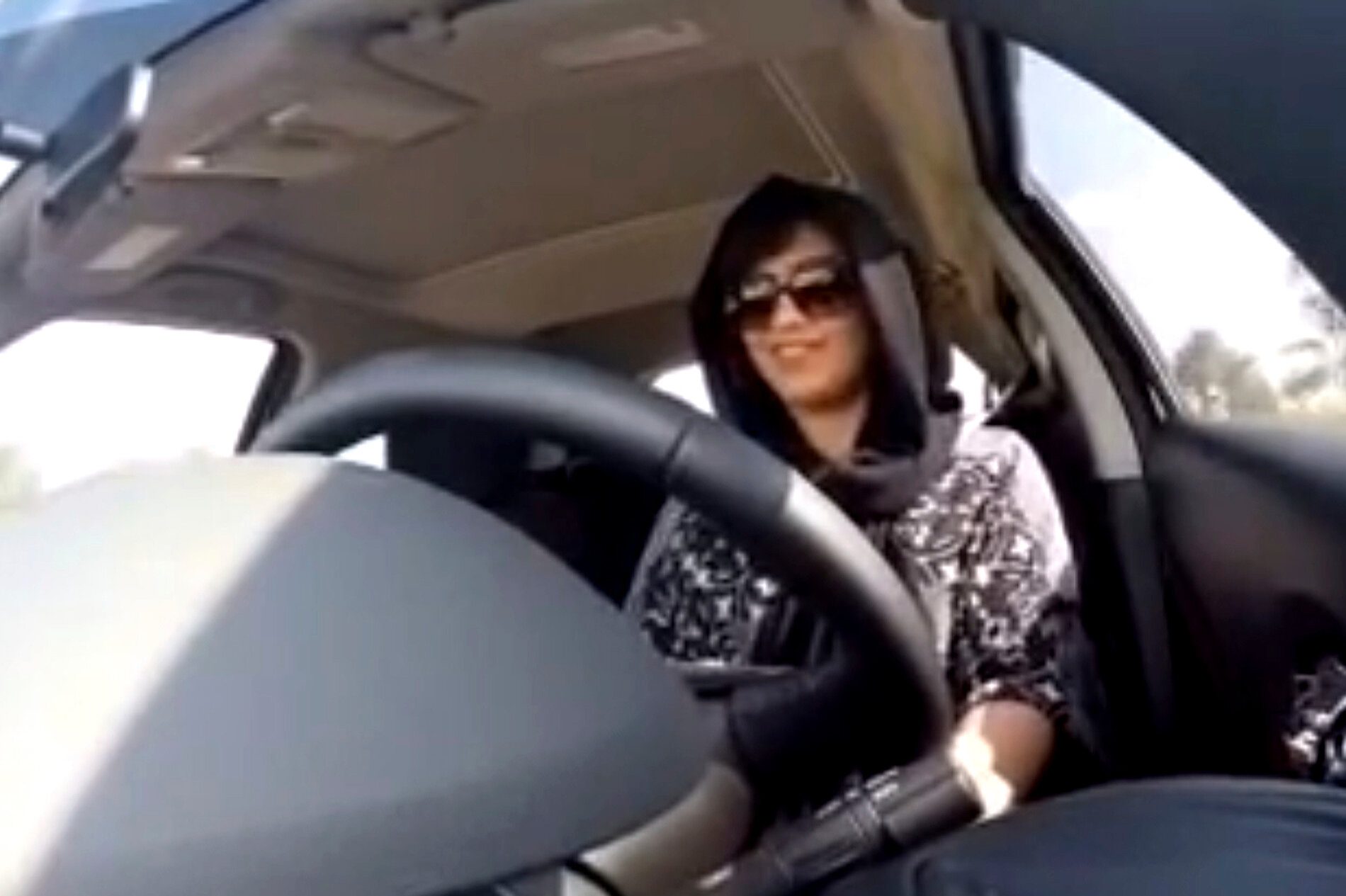Weeks before the ban on women drivers was lifted in Saudi Arabia in May 2018, a prominent Saudi activist, Loujain al-Hathloul, was arrested. In an effort to rebrand the kingdom as progressive and appease the newly sworn-in U.S. president, Joe Biden, the Saudi government, including the crown prince and de-facto leader, Mohammed bin Salman (MBS) of the Al Saud ruling family, released al-Hathloul from prison after 1001 days.
Famously known for publicly defying the ban and proudly campaigning for other women to follow suit, al-Hathloul was charged with several counts of treason and sentenced to five years and eight months in prison under a broad counterterrorism law. While the court has suspended two years and 10 months of her sentence, and granted time served for the other portion of her conviction (leading to her release in February), al-Hathloul is committed to appealing her ruling. Restrictions on leaving the country, speaking to the media and other forms of activism coincide with her release forcing her to keep fighting for justice.
Her arrest was likely triggered by her avid petitioning of the crown prince’s father, King Salman bin Abdulaziz Al Saud, to end male guardianship laws. Considered a significant hindrance to the realization of women’s rights in Saudi Arabia, male guardianship laws essentially legalize the subjugation of women by rendering them legal minors under the direct supervision of their male family members.
Al-Hathloul had already been assessed as “trouble” by the Saudi government since she decided to move back to Saudi Arabia after furthering her academic career at the University of British Columbia in Vancouver. Immediately upon reaching the airport in Riyadh, al-Halthoul filmed herself driving her family back to their home. Quickly becoming a viral sensation, her video garnered both criticism and support from all corners of Saudi Arabia, and even some of the Western world.
Despite being behind bars, al-Hathloul was a force to be reckoned with as she spoke out against the grave abuses committed against her and other inmates. Acts of sexual harassment, beating and even electrical shocks were commonplace in the prison.
A representation of the struggle for women’s rights and the repression of dissidents, Al-Hathloul remains a living and breathing stain on Saudi Arabia’s supposed push toward furthering human rights.
Saudi Arabia’s Rebrand for Joe Biden
So why has the Saudi Arabian government taken such tremendous steps to liberalize the country, including freeing dissidents like al-Hathloul and easing gender segregation?
The Saudi government has been under growing social and political pressure from its people to implement economic reforms that will ease poverty, raise employment rates and create more opportunities for the youth.
Although the unemployment rate is less than 6% (for comparison, America’s current unemployment rate is 6.3%), one-third of young Saudis are unemployed. The job sector, which is primarily in the energy sector, has not been able to create enough opportunities to handle the increase in the Saudi youth population.
As a response to this pressure from the population, MBS announced his plan “Vision 2030” to develop a diversified economy for Saudi Arabia. Not only will Saudi Arabia try to move away from utilizing oil as its main export, but it will also move key labor categories such as education and health care from the government arena into the private sector.
These economic reforms would follow secularizing social reforms that would even target gender inequality. After lifting the ban on women drivers, government officials announced that women would be able to attend public sporting events and be able to choose whether or not to wear the abaya or niqab when out in public.
It is important to note that the most stringent system of inequality, the male guardianship system, is still codified into law and adversely affecting Saudi women — though there have been some changes to the system that have just been announced in August of 2020, including allowing women to act as guardians for their children, register marriages and divorce.
There is another rather prominent reason that Saudi Arabia has pushed social reforms so rapidly in recent years. Saudi Arabia and the United States have been key allies since the end of World War II. For both U.S. and Saudi policymakers, cooperation between the two countries is considered to be a key aspect in preventing the rise of Iran as a regional hegemon.
However, Saudi Arabia’s uneasy record with human rights often strains the relationship between the two allies. As a member of the Security Council and a leader of the Western world, America has the responsibility to condemn violations of human rights, especially when they occur at a systematic level.
Therefore, when Saudi Arabia consistently jeopardizes its international reputation by killing civilians in Yemen and jailing and even murdering journalists like Jamal Khashoggi, America is expected to punish the country with strong sanctions — as they have done to Iran and North Korea when they refuse to comply with international nuclear weapons agreements.
The Donald Trump administration, to a large extent, ignored the persistent human rights violations committed by the Saudi government. Trump consistently praised the crown prince for his efforts to reform his country calling him “a truly spectacular ally in terms of jobs and economic development” and even chose Saudi Arabia as his first foreign trip as president. In fear of rupturing the relationship between the two countries, and prioritizing America’s strategic interests and arms sales, Trump’s response was lackluster (which was duly noted by MBS).
However, on Biden’s campaign trail, he was quite committed to taking an adversarial stance against Saudi Arabia and the crown prince. He explicitly stated that Saudi Arabia was a “pariah state” and that Biden would make the country “pay the price” for their actions. He even added that there was “very little social redeeming value in the present government in Saudi Arabia.” There was also talk that Biden would end arms sales to Saudi Arabia in order to end U.S. support for the Saudi-led war in Yemen.
In this uncertain atmosphere, the release of al-Hathloul seems much more calculated and less well-intentioned. Most experts have seen the release as a gesture to Biden, perhaps noting that the Saudi government would, at the very least, appear to be on its best behavior regarding human rights so America is not forced to condemn its relationship with the country.
Al-Haltloul’s sister, Alia, even praised Biden for his role in her sister’s release: “It was clear Biden’s arrival in office had contributed a lot in my sister’s release. I would even say thank you Mr. President.”
Biden was quick to respond to al-Haltloul’s release. “She was a powerful advocate for women’s rights and releasing her was the right thing to do.”
However, the recent decision of Biden’s administration to release the findings of the CIA’s assessment of the extent of the crown prince’s involvement in the gruesome killing of Khashoggi may cause more trouble. The report confirmed the already assumed notion that MBS had approved the operation to kill Khashoggi in the Turkish consulate.
Biden’s administration has responded to this report by sanctioning some of those involved in the assassination and imposing visa restrictions on those who have threatened dissidents. His response has been criticized by many who believe these types of actions rank similar to those of Trump. Anthony Blinken, secretary of state, has told reporters that America’s relationship with Saudi Arabia is bigger than any one individual, perhaps pointing to a more relaxed punishment.
Biden has added that he will make an announcement soon regarding Saudi Arabia and how his administration generally plans to navigate relations with the Middle Eastern country.
Is Saudi Arabia Actually Becoming More Progressive?
With the constant talk of the United States and Saudi Arabia’s foreign relations, and whether the liberal reforms are enough to foster American loyalty to MBS and forgive his major human rights violations, it is important to remember the people of Saudi Arabia who live with the effects of these policies (and lack thereof when no response is given to punish human rights violations).
So, with all these liberal reforms, is Saudi Arabia actually becoming a more progressive secular country for its people? The answer is rather complex. The people who live in Saudi Arabia are trapped in a paradoxical liminality in which their government becomes increasingly authoritarian while also forcing liberal reforms upon them. These reforms just display to the people who is actually in charge — change does not and will not come from the people, but rather will come when the Al Saud ruling family decides it will.
These liberal reforms have brought more shifts in thinking to some urban parts of the country, including the ever-growing acknowledgment that women are independent enough to create their own future. Men are shifting their attitudes and showing a deeper respect for the women in their lives, giving them both agency and freedom.
However, many of the social norms that have been constructed in rural areas (and in impoverished urban areas) due to the legal subjugation of women have been slow to follow suit. Marginalized women will likely still have to fight against their families and their communities to gain their right to basic tasks such as driving and going places without male relatives.
Many women (and men) would also still never be able to express their opposition to the government without landing in jail. Dissent against the government, particularly the ruling family, remains an incredibly dangerous act.
Therefore, the release of al-Hathloul and other liberals should not be taken as a sign of a political opening in the country; these reforms should not be taken at face value, and American policymakers must recognize that their lack of action against the Saudi government and support for these small concessions have direct impact upon the Saudi people — not just American-Saudi foreign relations.

















